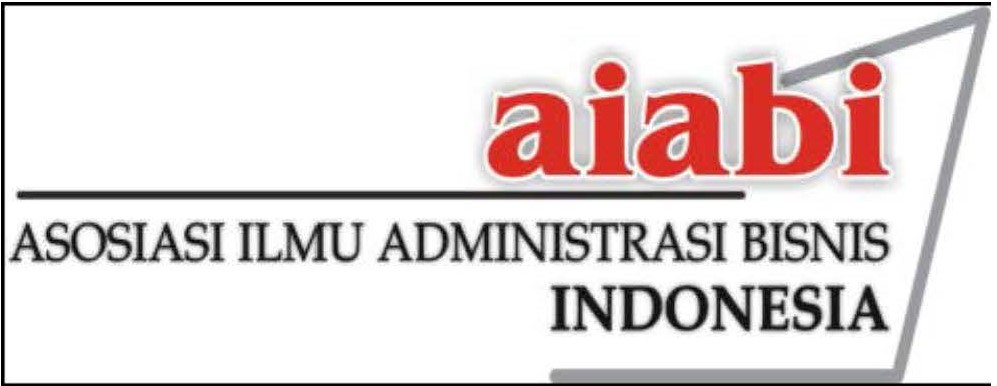PENGARUH KOMITMEN AFEKTIF, KOMITMEN BERKELANJUTAN DAN KOMITMEN NORMATIF TERHADAP KINERJA PENGURUS KOPERASI DI KOTA SUKABUMI, JAWA BARAT
Abstrak
A cooperative is an economy-based organization that is owned and operated by a group of people for the common interest. However, over time, the conditions for the development of the cooperative declined. One of them is the condition of growth and development of cooperatives in the city of Sukabumi. This is what makes the author's basis for conducting research. The purpose of this study was to determine and analyze affective commitment, continuous commitment, normative commitment and the performance of cooperative management in Sukabumi City. The method used is a quantitative research method with explanatory research type. Data were analyzed using SMART PLS 3. The sample size was 42 respondents using the Random Sampling Technique. The data collection technique is done by distributing questionnaires, interviews, and documentaries. The results of this study indicate that affective commitment has a significant effect on performance, continuous commitment has a significant effect on performance, and normative commitment has a significant effect on performance. Furthermore, these three variables have a significant and simultaneous effect on the performance of cooperative management in Sukabumi City. The affective commitment variable is in the high category and has the highest average value achievement of 3.68.
Koperasi merupakan sebuah organisasi berbasis ekonomi yang dimiliki dan dioperasikan oleh sekelompok orang demi kepentingan bersama. Namun seiring berjalannya waktu, kondisi perkembangan koperasi semakin menurun. Salah satunya kondisi pertumbuhan dan perkembangan koperasi yang ada di kota Sukabumi. Hal ini yang menjadikan dasar penulis untuk melakukan penelitian. Tujuan penelitian ini adalah untuk mengetahui dan menganalisis komitmen afektif, komitmen berkelanjutan, komitmen normatif dan kinerja pengurus koperasi di Kota Sukabumi. Metode yang digunakan yaitu metode penelitian kuantitaf dengan tipe explanatory research. Data dianalisis menggunakan SMART PLS 3. Ukuran sampel adalah 42 responden dengan Random Sampling Technique. Teknik pengumpulan data dilakukan dengan cara menyebarkan kuesioner, wawancara, dan dokumenter. Hasil penelitian ini menunjukkan bahwa komitmen afektif berpengaruh secara signifikan terhadap kinerja, komitmen berkelanjutan berpengaruh secara signifikan terhadap kinerja, dan komitmen normatif berpengaruh secara signifikan terhadap kinerja. Selanjutnya, ketiga variabel tersebut berpengaruh secara signfikan dan simultan terhadap kinerja pengurus koperasi di Kota Sukabumi. Adapun variabel komitmen afektif berada pada kategori tinggi serta memiliki pencapaian nilai rata-rata tertinggi yaitu sebesar 3,68.
Kata Kunci
Teks Lengkap:
PDFReferensi
Ardiansyah, -, Ardiansyah, -, & Afandi, E. (2019). Impact of Affective Commitment with Employee Performance Moderated by Organization Citizenship Behavior (OCB). https://doi.org/10.2991/acpch-18.2019.64
Ashfaq, B. (2020). Person-organization fit and organization citizenship behavior: modeling the work engagement as a mediator. Asia-Pacific Journal of Business Administration, 13(1), 19–39. https://doi.org/10.1108/APJBA-12-2019-0255
Bernardin, H. J., & Russell, J. E. A. (2013). Human Resource Management An Experiential Approach (6th ed.). McGraw-Hill Irwin.
Bretos, I., Díaz-Foncea, M., & Marcuello, C. (2018). Cooperatives and internationalization: An analysis of the 300 largest cooperatives in the world. CIRIEC-Espana Revista de Economia Publica, Social y Cooperativa, 92. https://doi.org/10.7203/CIRIEC-E.92.11480
Campbell, J. K., & Hwa, Y. S. (2014). Workplace spirituality and organizational commitment influence on job performance among academic staff. Jurnal Pengurusan, 40. https://doi.org/10.17576/pengurusan-2014-40-10
Castilla-Polo, F., & Sánchez-Hernández, M. I. (2020). Cooperatives and sustainable development: A multilevel approach based on intangible assets. Sustainability (Switzerland), 12(10). https://doi.org/10.3390/su12104099
Ghozali, I. (2014). Structural Equation Modeling Metode Alternatif dengan Partial Least Square. Badan Penerbit Universitas Diponegoro.
Gibson, J. L., Ivancevich, J. M., & Donelly, J. H. (2011). Organizations: Behaviour, Structure, Processes. In McGraw-Hill.
Joneta, C., Anugerah, R., & Susilatri, S. (2016). Pengaruh Komitmen Profesional Dan Pertimbangan Etis Terhadap Intensi Melakukan Whistleblowing: Locus Of Control Sebagai Variabel Moderasi. Jurnal Online Mahasiswa Fakultas Ekonomi Universitas Riau, 3(1).
Joseph, G. (2013). The Influence Of Affective Commitment, Continuance Commitment, And Normative Commitment To Job Performance At Pt. Bank International Indonesia Manado. Jurnal Riset Ekonomi, Manajemen, Bisnis Dan Akuntansi, 1(4).
Kasogela, O. K. (2019). The Impacts of Continuance Commitment to Job Performance. Advanced Journal of Social Science, 5(1). https://doi.org/10.21467/ajss.5.1.93-100
Luthans, F. (2011). Organızatıonal Behavıor: An Evidence-Based Approach. McGraw-Hill/Irwin.
McShane, S. L., & Von Glinow, M. A. Y. (2018). Organizational Behavior : Emerging Knowledge. Global Reality (8th) Edition. In McGraw-Hill.
Oyeniyi, K., Adeyemi, M., & Olaoye, B. (2017). Organizational Commitment a nd Employee ’ s Job Performance : Evidence from Nigerian Hospitality Industry. International Journal of Innovative Psychology & Social Development, 5(3).
Putro, P. U. W. (2018). Etika Kerja Islam, Komitmen Organisasi, Sikap Pada Perubahan Organisasi Terhadap Kinerja. Jurnal Manajemen Indonesia, 18(2). https://doi.org/10.25124/jmi.v18i2.1205
Rafiei, M., Taghi Amini, M., & Foroozandeh, N. (2014). Studying the impact of the organizational commitment on the job performance. Management Science Letters, 4(8). https://doi.org/10.5267/j.msl.2014.6.046
Ribeiro, N., Nguyen, T., Duarte, A. P., Torres de Oliveira, R., & Faustino, C. (2020). How managerial coaching promotes employees’ affective commitment and individual performance. International Journal of Productivity and Performance Management. https://doi.org/10.1108/IJPPM-10-2018-0373
Robbins, Stephen P., & Judge, T. A. (2017). Organizational Behavior (17th) Edition. Pearson Education Limited.
Srimulyani, I., Murniningsih, R., & Raharja, B. S. (2017). Pengaruh Komitmen Organisasional terhadap Kinerja Karyawan dengan Organizational Citizenship Behavior ( Ocb ) sebagai Variabel Moderating. University Research Colloquium, ISSN 2407-.
Sugiyono. (2015). Metode Penelitian dan Pengembangan Pendekatan Kualitatif, Kuantitatif, dan R&D. In Metode Penelitian dan Pengembangan Pendekatan Kualitatif, Kuantitatif, dan R&D.
Sumarni, S., & Pramuntadi, A. (2019). Pengaruh Komitmen Organisasi Terhadap Kinerja Perawat di RS PK Muhammadiyah Bantul. Jurnal Manajemen Kesehatan Yayasan RS.Dr. Soetomo, 5(2). https://doi.org/10.29241/jmk.v5i2.157
Sungu, L. J., Weng, Q., Hu, E., Kitule, J. A., & Fang, Q. (2020). How Does Organizational Commitment Relate to Job Performance? A Conservation of Resource Perspective. Human Performance, 33(1). https://doi.org/10.1080/08959285.2019.1699562
Syarif, M. (2019). Wakil Walikota: Perkembangan Koperasi di Kota Sukabumi Masih Stagnan - Sebanyak 96 Koperasi Akan Dibubarkan Oleh Kemenkop. Neraca.Co.Id.
Tola, M., Ationg, R., & Mansur, K. (2021). Gerakan Koperasi di Sabah (1960an hingga 1980an): Peranan dan Cabaran. Malaysian Journal of Social Sciences and Humanities (MJSSH), 6(1). https://doi.org/10.47405/mjssh.v6i1.625
Vandenberghe, C., Mignonac, K., & Manville, C. (2015). When normative commitment leads to lower well-being and reduced performance. Human Relations, 68(5). https://doi.org/10.1177/0018726714547060
Wang, Q., Weng, Q., & Jiang, Y. (2020). When Does Affective Organizational Commitment Lead to Job Performance?: Integration of Resource Perspective. Journal of Career Development, 47(4). https://doi.org/10.1177/0894845318807581
DOI: https://doi.org/10.24198/adbispreneur.v6i1.32494
Refbacks
- Saat ini tidak ada refbacks.









